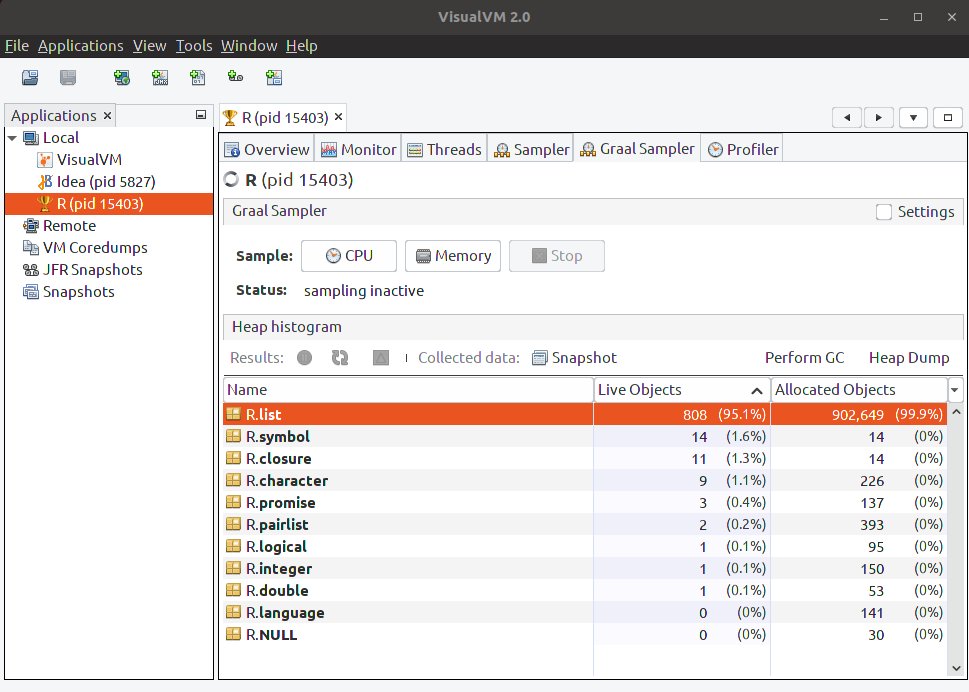fastr
 fastr copied to clipboard
fastr copied to clipboard
strange performance issue, non-linear increase in runtime
The execution times in the following very simple program are linearly increasing in GNU R, but somehow exploding in fastr. On my machine the 10 results for GNU R are from 0.04s to 0.4s, whereas on fastr it is 4, 19, 44, timeout....
execute <- function(n) {
x <- list()
for (i in 1:n) {
x[[i]] <- i
}
}
i = 100000
while (i <= 1000000) {
print(system.time(execute(i)))
i = i+100000
}
Hello,
thank you for reporting this issue. The problem is in x[[i]] <- i, which causes re-allocation of the list (growing it by one). Somehow GNU-R manages to handle this much faster. We will take a look at how to fix this. One possibility is to grow the list by more than one element if we detect such code pattern. For now, you can fix this by pre-allocating this list yourself (which is what I would recommend doing even for GNU-R) like this:
execute <- function(n) {
x <- vector(mode = "list", length = n)
for (i in 1:n) {
x[[i]] <- i
}
}
i = 100000
while (i <= 1000000) {
print(system.time(execute(i)))
i = i+100000
}
with this R code I am getting on FastR:
user system elapsed
0.080 0.003 0.084
user system elapsed
0.070 0.007 0.078
user system elapsed
0.070 -0.008 0.066
user system elapsed
0.000 0.009 0.030
user system elapsed
0.010 -0.003 0.008
user system elapsed
0.010 -0.002 0.008
user system elapsed
0.01 0.00 0.01
user system elapsed
0.000 0.012 0.012
user system elapsed
0.010 0.003 0.012
user system elapsed
0.020 -0.006 0.014
for comparison, this is GNU-R with the same R code and on the same machine:
user system elapsed
0.029 0.004 0.033
user system elapsed
0.056 0.000 0.056
user system elapsed
0.123 0.000 0.123
user system elapsed
0.108 0.012 0.120
user system elapsed
0.13 0.00 0.13
user system elapsed
0.175 0.013 0.187
user system elapsed
0.271 0.000 0.270
user system elapsed
0.191 0.028 0.219
user system elapsed
0.340 0.008 0.348
user system elapsed
0.378 0.023 0.402
For now, you can fix this by pre-allocating this list yourself (which is what I would recommend doing even for GNU-R) like this:
thanks for the suggestion. the code snippet is actually not something I use and I am aware that the increase by one is probably at fault for constantly re-allocating that vector (though I don't know how to debug this in FastR to know for sure).
I just found it to be a fairly striking performance oddity and wanted to let you know. are you generally interested in such snippets?
though I don't know how to debug this in FastR to know for sure
Actually, we have really great tool for this: VisualVM has support for CPU and memory tracing of GraalVM languages like FastR.

I just found it to be a fairly striking performance oddity and wanted to let you know. are you generally interested in such snippets?
yes, it is very useful. I was not aware that GNU-R is probably optimized for this code-pattern. We must match all such optimizations, because people will use these code patterns if they work fine on GNU-R.